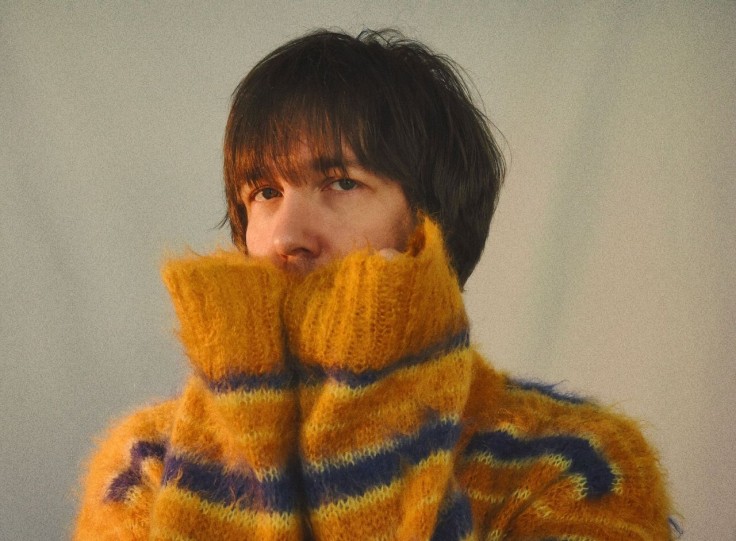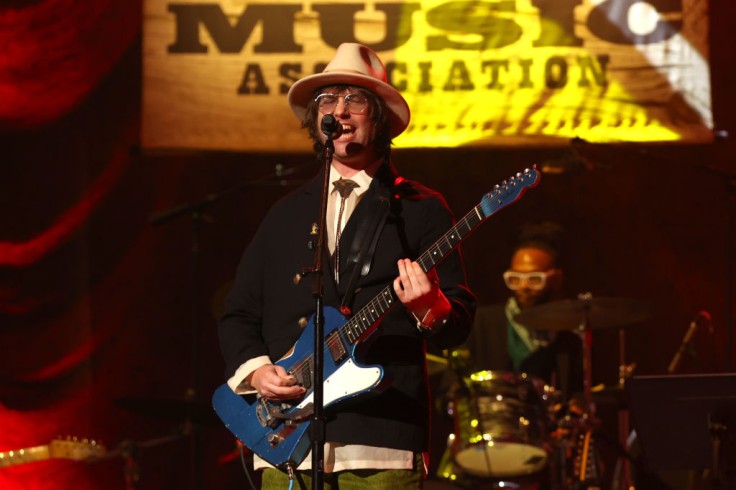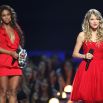
One might not expect a bisexual Orange Country misfit who cut his teeth in the New York club scene as a founder of Lady Gaga-associated glam-rock trailblazers Semi Precious Weapons, later vamped it up in a revamped lineup of actual glam-rock originators New York Dolls, and along the way rubbed glittery shoulders with Yoko Ono and Lydia Lunch to now be residing in East Nashville and leading an alt-country revolution. But here we are. What a time to be alive.
Yes, in an evolved age when Orville Peck can record a queer classic with Willie Nelson and Beyoncé is making history as the first Black woman to top Billboard's Country Albums chart, the aptly titled Stellar Evolution by singer/songwriter/storyteller/shapeshifter Aaron Lee Tasjan — an "audiophile" who's simply "listened to too much music to not be influenced by all different genres" — sounds totally of-the-moment, like the past, present, and future. And while the orange vinyl LP's heady blend of rhinestone-cowboy heartland rock, grievous-angel folk, electric-lit-orchestral powerpop, John Hughes-soundtrack synthpop, '90s slacker indie, and wry, Petty wit may not sound classically "country," it sounds classic.
But unfortunately, as much as Nashville has evolved — sonically, socially, and stellar-ly — it has also de-volved. "We're seeing two very different stories in country music right now: One that is that's absolutely moving forward, and one that is going way backwards," Tasjan, who moved to East Nashville from Brooklyn in 2019 and quickly found a supportive circle of artist friends there, tells Music Times. So, as he began crafting Stellar Evolution, much of the record became "a very direct response to seeing my community falling under attack. It was really at a certain point that, whether I even wanted it or not, that's just what started coming out in these songs."
Tasjan recalls, "I was seeing all these drag bans, and couple of towns over from us here in Nashville, it only lasted for about 36 hours or maybe not even that, but [Murfreesboro] successfully made it illegal to be a gay person! It's really amazing to me, because there's absolutely no effort made to make it look like anything other than what it is — which is just a pure agenda of hate that these motherf---ers are perpetuating on a daily basis. They go far out of their way to be as exclusionary as possible, not just to members of my community as a queer person, but to Black and transgender folks. ... There are even people out there saying it's their 'dream' to have trans people eradicated from the face of the Earth. I mean, that's not a dream! That's just a hateful wish, based on fear and a self-obsession that's led you to a point where empathy isn't possible for you."
An always clever and confessional lyricist, Tasjan, 37, wanted his deeply personal fifth album to feel like a "safe space" for his friends and fans, so while processing and addressing all of this trauma, he mined his own past for darkly humorous inspiration. "Cry Till You're Laughing" is the title of one baroque, brokenhearted track, and Tasjan often seems to be doing just that. "To me, it's about creating a balance, because that's really what comedy is: tragedy plus time," he explains. "Being able to find the humor in those situations is ultimately what helps me to buoyant when I'm moving through them. It's in no way meant to ever make light of or any of these serious, bigger topics. It's really meant to just be an example, to show there are a lot of different ways to deal with things. Mine happens to be a laugh and a wink, and that works for me. And whatever works for you, as long as it doesn't hurt anybody else, I say go with it."
For instance, there's the high school confidential "Horror of It All," accompanied by a high-camp, low-budget, grainy-VHS music video that evokes the greatest straight-to-cable teen slasher flicks, teen sex comedies, and Teen Wolf sequels of the 1980s. A sweaty swirl of synths, hormones, and "complicated, messy emotions," the deceptive upbeat single was inspired by a time when a teenage Tasjan was in "a completely isolated place" and realized he was "not just attracted to the opposite sex in my class, but kind of to everybody. I was trying to get to the feeling of that inner world of being afraid to share a part of yourself because you're going to be rejected, made fun of, all those things." One notable verse references hallway-whispered rumors about Tasjan "in the 12th grade band room, giving head to the baseball captain."
"I was not out in high school, but that did not stop me from having romantic experiences with people of the same sex," Tasjan reveals. "It just felt like something that you had to be a secret — and it's really hard to keep secrets. There's an added layer of challenge when you're keeping the secret not just for yourself, but also for somebody else who doesn't want anyone to know. Any time there's that kind of secretiveness around something that feels to me like a very natural expression of just being a person, it can cause you to wonder: 'Am I wrong? Is what I did wrong? Did we do something wrong in just having this experience that millions of young people have in their lives?' There's a weight that goes along with that. And so, 'Horror of It All' was an attempt to tell people who might be experiencing this that it's going to be OK. Yes, it's really hard, but in the end, we all have to be who we are. And it's in the realization of that, when we are able to embrace those parts of ourselves that we first worried might be weaknesses, that we find our true strength."
"Nightmare," much like "Horror," at first seems like just a summer-soundtrack indie-pop bop — but as its title indicates, it too delves into some scary stuff. The tune, which is about Tasjan's sadly all-too-realistic fear of becoming the victim of a hate crime, opens with him softly, poignantly crooning, "There's no other life I could be living/As I fix my makeup in the car/It's Friday night and I'm going out dancing/Here's to hoping I make it that far."
"The first time that I ever experienced anything like that, I was on my way to play a show. I was maybe 19 or 20 years old," Tasjan recalls. "I got in a Taco Bell drive-thru line, and a truckload of teenagers pulled up behind me. And ask just about any queer person, they probably will tell you people that some of the people they get the most nervous around, immediately, are teenage boys. So, I was trying to make an order, just getting something to eat before I went to my gig, and these kids are hanging off the rafters of their pickup truck, screaming at me, 'D---'s not on the menu, f----ot!' ... Then even came over to the car while I was trying to eat and were banging on the windows saying this stuff to me. It was freaky. I guess they just sort of sensed that I had some vaguely feminine qualities to me that they found to be upsetting, for whatever reason."
Other Stellar Evolution cuts, while offering just as impactful social commentary, are more celebratory. There's the funky "Pants," which encourages self-expression through gender-bending fashion ("Dress me up or dress me down/Painted jeans or a ballroom gown/I know what it means to be a man/The world is gonna wear you out/So honey, wear whatever you want to"), and the sassy and sardonic state-of-the-union anthem "I Love America Better Than You," in which Tasjan boldly declares: "I love America better than you/Her Founding Mothers and her hot dogs too/First Black president/Insurrectionists... Land of immigrants/Queer trans feminists/I love America better than you!" Says Tasjan of that surprisingly hopeful, eight-years-in-the-making protest song, "I wanted to voice something that is critical of who we've become as a nation, but I know if you're going to change someone's mind, you can only change it through love. The only way is to soften yourself in your approach, so that they don't turn to stone when you try to engage them. ... I think the song, really at its heart, is an attempt to start a conversation."
Tasjan clarifies: "I still love the idea of America. I think ideas are really powerful, and I think the idea of 'America' is a very powerful idea. I don't know what will happen going forward, especially if someone like Donald Trump becomes president again; I think of how emboldened lawmakers here in Nashville have felt to go against queer folks with Joe Biden in office, so if Trump was the president again, I can't imagine they wouldn't feel even more emboldened! That idea is terrifying to me. But I love the idea of America, and I would love to see us get back to a place we can really implement the concepts of free speech and freedom responsibly, with an eye to what is good for the whole of us and not just for a few based on our religion or political affiliation or whatever is dividing us. So yeah, I don't love where we are right now, but I love conceptually where we started and where I think we could be again — if we want to be."

As for where country music has been, where it's going, and what it could be, Tasjan — who recently received a Grammy nomination for his work with Black, British country/soul artist Yola, and produced openly trans Kill Rock Stars Nashville signing Mya Byrne's new album Rhinestone Tomboy — states, "We're seeing two very different stories in country music right now: One that is that's absolutely moving forward, and one that is going way backwards." He readily points out that queer people and people of color "have been an integral part of country music since the beginning of time," even citing the fun fact that "one most recognizable songs in the country music canon," Jerry Reed's "East Bound and Down," was co-written in 1977 by a then-closeted trans woman named Deena Kaye Rose, who didn't come out until 2014.
"The genre was co-opted and made into this thing that people think of as being 'white music,' or 'straight music,' but we've always existed. I think it's great is to be able to have recognition for the success openly now, as a queer person, so that other people who are similar can see themselves in that mirror and feel inspired to do something that'll be the next generation," Tasjan says. "And I know there's a long way to go, but I think [openly gay mainstream country star] TJ Osborne and the Brothers Osborne are absolutely the way of the future. I think Orville Peck is the way of the future. And I think people like Mickey Guyton are the answer to the people like Morgan Wallen. My hope is that the soul-searching that's happening right now in Nashville will continue, and people will continue to face hard truths and ask themselves tough questions. Because it's the only way that we can actually move forward together."
© 2026 MusicTimes.com All rights reserved. Do not reproduce without permission.







